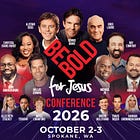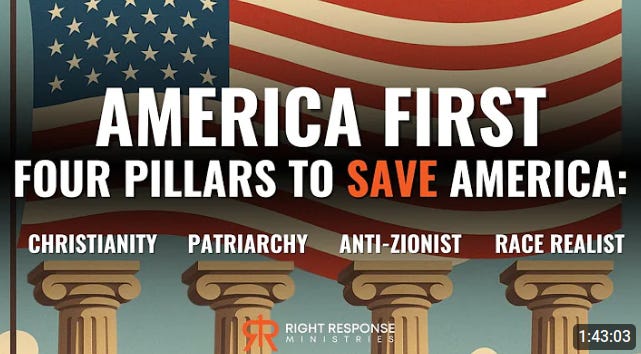The Great Evangelical Schism: Epilogue
This post is the final installment of an essay series. The first installment can be read here:
In previous installments I described how a degradation of the doctrine of sanctification, in favor of a hyper-focus on justification, left a hole in Evangelical praxis that was filled by syncretizing the American folk religion of politics. This shift to political orthodoxy acting as the primary test of fidelity resulted in a further degradation of theology, to where now even Nicene orthodoxy can no longer be assumed among members of the demographic. We are already at a point where it can be said that those who have unquestioningly followed this tangent are members of a different sect of Evangelicalism than orthodox Protestants, but the time is rapidly approaching where “sect” will no longer be a sufficient term. What will this impending great schism, in which the religion of Cultural Evangelicalism steps out, possibly look like?
An easy epicenter of the schism to pinpoint is hyper-political megachurches. A key value proposition for many megachurch attendees is the ability to remain a fairly anonymous attendee. You can show up on Sunday mornings, receive an emotional boost from the concert experience and motivational sermon, then go back home for the week without ever having been accosted by members who recognize you as a regular attendee and want you to get more involved; I have spoken to people who said this lack of accountability is what they look for in a church. This environment is the epicenter of doctrinal deterioration, because these churches need this class of nominal attendee to survive. Sermons in these churches are often geared to attract and retain such attendees, which means that the overall membership is eventually dominated by such nominal Christians. Megachurches bring so much money to the table that they become prevalent within denominational politics. Hickory Grove Baptist Church, at which the current Southern Baptist Convention President, Clint Pressley, serves, has over 18,000 members. Compare this to the average SBC church, which only has 233 members. As megachurches, such as the SBC’s 20,000 attendee Lakepointe church and its pastor, Josh Howerton, delve deeper and deeper into making politics the center of their “Christianity,” doctrine will continue to devolve within the low church. How can it not, when it takes nearly one hundred average SBC churches to match the influence on individuals of one Lakepointe? How can it not when those average churches get their discipleship material from a media apparatus that favors megachurch pastors who have all the time in the world to speak at conferences, write books and make video series, because they have staff who handle hospital visits?
Interestingly, the other easy epicenter of the schism to track is reactionary Christian podcasting, heavily populated by an inverse world of pastors with such small congregations that they also have spare time to build little media empires with an outsized influence in denominational politics. The self-ordained pastor Joel Webbon is a key example. Fleeing pending discipline from his San Diego Acts 29 church, Webbon set up shop outside of Austin, Texas, where he preaches every Sunday in the event space of a local food hall. From his small podcasting set made up to look like a humidor, he makes insane proclamations, such as naming “anti-Zionism” and “race-realism” as prerequisites to “save America.” Unlike the megachurch, this fault line doesn’t run through the nominal church attendee, but the most obsessive members, and even pastors, of reactionary churches.
What is a cascading problem begins with the most extreme podcasting voices, like Webbon, Stephen Wolfe, Eric Conn and Doug Wilson, whose ridiculously over-the-top rhetoric is red meat for progressive outlets. Being the target of organizations that are often explicitly anti-conservative-Christian, such as Right Wing Watch, gives these bombasts a sort of folk hero status among the most reactionary Christians. Though these podcasting pastors have little direct influence in other churches, most conservative churches in America, especially of the Reformed variety, have at least one or two dedicated fans, who are often instigators of internal division. Throughout the rest of online Christian media, more mainstream reactionary, and even conservative, podcasters have to deal with a much larger portion of their audience being comprised of fans of the extremists, resulting in a wariness to publicly rebuke or distance themselves, especially to name names, for fear of losing market share—the most patriarchal voices in the mainstream even maintain friendly ties with the extremists. This trickles down into denominational politics, as this more mainstream tier of online media pastors regularly injects itself into hot-button issues, such as female “deaconesses” in the Presbyterian Church in America. Therefore, an issue that was already being addressed in the normal Presbyterian manner becomes one fought in the court of online opinion, where patriarchalist and race-realist podcasters (who often overlap) declare that the average ruling elder has “gone woke,” simply for not proactively “saving the PCA from feminism.”
Increasingly, dedicated orthodox Protestants are becoming fed up with incursions into the faith from these two fronts, and a breaking point of full-blown schism will eventually be reached. One question that remains is which side will win in these two prominent, conservative denominations. In the SBC, the Reformed extremists have already made too many enemies among the power-brokers to ever attain power. I expect them to break away and create their own association, while the Arminian, megachurch-level political syncretizers are likely to continue to push the SBC in their direction, if for no other reason, based purely upon their numbers-based influence. The PCA, being doctrinally sound and on the cusp of releasing a report that will likely be a huge blow to Christian Nationalism, is likely to rebuff the current advances of Cultural Evangelicalism. Yet, the political aspects of the emerging religion has a very strong hold on many of its up-and-coming, Gen-Z and millennial ministers. I suspect that the real Presbyterian battle will take place in the next ten to twenty years.
Perhaps all of this is, on a national scale, inconsequential, since Nondenominationalism seems to be the future of Protestant Christianity in America; one can even make the case that the most influential megachurches in the SBC are functionally Nondenominational. Here, there is little to no care for the historic interpretation and application of Scripture, little to no care for a progressive sanctification towards demonstrable piety and little to no care to keep secular political strife at arm’s length. Those of us who do care about those imperatives of our tradition, our religion, will have our work cut out for us, but if there’s anything I’m sure of it’s that we who care about essentials like the ontology of Father, Son and Spirit will have Their support.





Everything you’ve said is what drove me away from Protestantism and into Eastern Orthodox. There is no accountability where you are, everyone is their own pope. If you want ‘orthodox’ as you keep saying, come on over. And before you start, I know you’ll find plenty of reasons why you think they’re just as politically influenced. Maybe some bishops are, but the doctrine has had 2000 years and people a whole lot smarter and righteous than me to figure it out. Once I humbled myself and took the first step, I found a deeper communion with Christ.